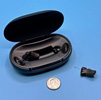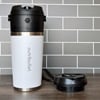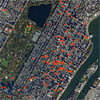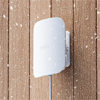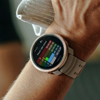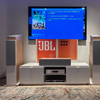We may earn commissions when you buy from links on our site. Why you can trust us.
Are Personal Air Purifiers Worth It? The EPA Weighs In
Concerns about air quality are on the rise due to factors like extended wildfire seasons, seasonal allergies, and airborne illnesses. As a result, many are turning to personal air purifiers as a solution. These compact devices are designed for use in small spaces, like your car. But just how effective are these devices?
In a recent interview, an Environmental Protection Agency (EPA) spokesperson told us, "As long as they are used in spaces sized within their range of effectiveness (as indicated by the Clean Air Delivery Rate or CADR), and they are using established technologies (e.g., mechanical filtration via a HEPA filter), these devices can be expected to work in small spaces as effectively as larger devices rated for larger spaces."
So, if you're looking for a personal air purifier for your car to eliminate odors or exhaust fumes, they will work if you know what to look for. Not all products use HEPA filters or other effective technologies; for example, some use ionization alone, which is not as strongly supported by research. Here's what you need to know and our product recommendations.
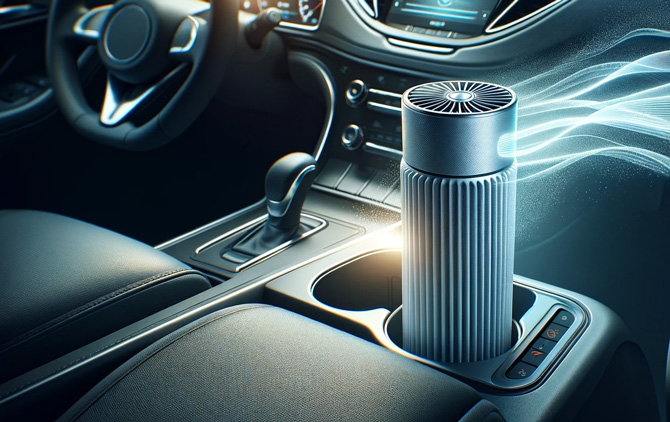
How personal air purifiers work
Personal air purifiers improve indoor air quality by using a fan to circulate the air through the device to clean it. Depending on what types of pollutants you're looking to remove, each technology provides specific benefits.
Targeted allergy relief
Dust, pollen, smoke, and pet dander are all particles that cause lung irritation and impact those with allergies, asthma, or other respiratory conditions. High-Efficiency Particulate Air (HEPA) filters are designed to trap up to 99.97% of these airborne particles as small as 0.3 microns. They help alleviate symptoms and improve overall comfort.
Smoke and odor removal
Personal air purifiers are good at eliminating smoke and other unpleasant odors from indoor spaces. Their HEPA filters capture smoke particles and other airborne contaminants, while activated carbon filters and similar filters absorb odors and volatile organic compounds (VOCs), effectively neutralizing them. Say goodbye to cigarette smoke and cooking odors and hello to fresh and clean air.
Prevent viral and bacterial spread
According to studies published in the Journal of Building and Environment, air purifiers with HEPA filters can help reduce the spread of viruses and bacteria by capturing airborne particles that may contain infectious pathogens. While they don't replace preventive measures like handwashing and social distancing, they offer an additional defense layer.
What about ionization?
Many personal air purifiers release ions into the air to neutralize pollutants, so there are no pricey filters to replace. However, we do not recommend using a model that only uses this method. The effectiveness is less documented, and unless a product has UL 2998 certification, it could generate ozone, which is toxic even at low concentrations.
Assessing the effectiveness of an air purifier
An easy way to gauge an air purifier's effectiveness is by checking its Clean Air Delivery Rate (CADR). This industry-standard rating measures how quickly a purifier cleans 100% of a cubic square foot of air per minute for a specific pollutant – tobacco smoke, pollen, or dust. The higher the CADR, the faster it can clean a specific-size space.
The EPA recommends that air be fully cleaned at least four times per hour. So, to calculate the appropriate CADR rating for your space, a quick and easy way is to take the volume of your space and divide it by 15. For example, if the interior of your car is approximately 100 cubic feet, divide 100 by 15 to get an ideal CADR rating of about 7.
Confusingly, some manufacturers provide CADR ratings in cubic meters per hour. For those not interested in doing the complete math, divide the cubic meter/hour rating by 1.7 to get the equivalent cubic foot/minute rating.
However, the EPA cautions that in partially confined spaces, like cubicles. "The devices may or may not be effective depending on how much air circulation there is in the larger room where they are used and how closely they are placed to a person. The air flow from the HVAC system, or the movement of people, may be such that their effectiveness drops much below their rating."
The EPA is also wary of wearable air purifiers. "In this case, again, the effectiveness will vary case-by-case, as it depends on the air movement around the wearer's head."
Many personal air purifiers don't provide CADR ratings, which makes it difficult to determine whether they will provide enough filtering for your space. I recommend sticking with those models that do so you can trust their efficacy.
Other things to consider when buying a personal air purifier
While cleaning ability is important, a device's maintenance cost and noise level should also be considered. These factors significantly impact the usability and overall cost of ownership.
The air purifier's noise level, primarily determined by fan noise, should be as low as possible for comfort. A decibel rating of 24 would be considered whisper quiet, while 55 dB would be normal conversation level. In our research, all of the personal air purifiers that used HEPA filters and received CADR certification that would effectively clean a personal space had an audible fan noise of at least 40 dB. Be wary of models touting "whisper quiet operation" without the associated performance stats.
The air purifiers we recommend use filters – usually HEPA or a combination of HEPA and activated carbon. Typically, you'll need to buy a new filter after six months to a year. So, check the replacement filter costs to ensure you won't get sticker shock later.
Two personal air purifiers we recommend
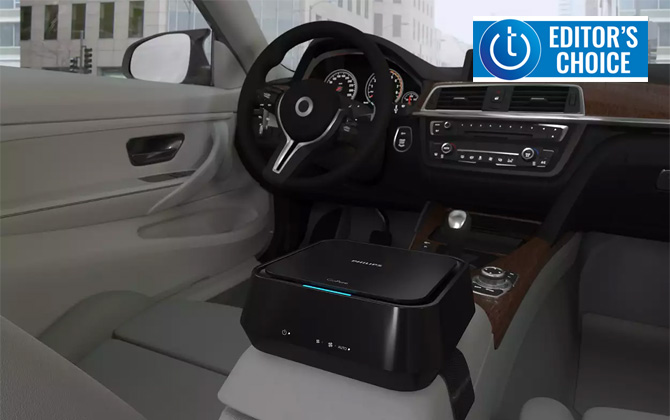
Our recommended in-vehicle air purifier: Philips GoPure GP5212
The Philips GoPure GP5212 is your on-the-go solution for cleaner, healthier air in your vehicle. Its powerful 3-stage filtration system removes harmful particles, bacteria, viruses, toxic gases, allergens, and even unpleasant odors. It operates from 40 to 55dB at the highest fan speed. With a CADR of 16 m3/hour (9.4 cubic feet/minute), it can filter 100% of your car's interior in about 12 minutes.
Unique to Philips, the SelectFilter Plus technology includes a HESA layer that actively decontaminates harmful gases like exhaust fumes and chemical emissions from interior materials. The HEPA filter tackles even ultrafine particles, bacteria, and viruses down to 0.015 microns. A pre-filter screens out large particles, like dog fur.
Use the included accessories and long power cable to install it on your armrest, headrest, or under seats.
Price: $77.59, replacement filters $23.00
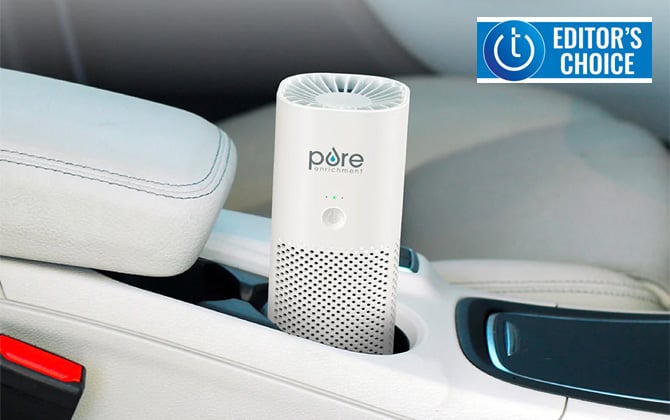
Budget pick for smaller spaces: Pure Enrichment PureZone Mini
The PureZone Mini Portable Air Purifier from Pure Enrichment brings cleaner air to tiny spaces with its CADR of 4 CFM. This compact device tackles dust, allergens, smoke, odors, and germs thanks to its two-stage filtration system featuring a HEPA filter and activated carbon pre-filter.
Incredibly portable, the PureZone Mini measures a mere 8.5" x 3.3" x 2.7" and weighs less than a pound. Its built-in rechargeable battery lasts up to 12 hours, freeing you from cords.
The quiet operation (only 50 dB) lets you comfortably carry on conversations while the PureZone Mini works its magic.
At $39.99, the PureZone Mini is a bargain. However, keep in mind that with its lower CADR rating, it's better for smaller spaces.
Price: $39.99, replacement filters $9.99
[Image credit: personal air purifier concept generated by OpenAI's DALL·E, Philips, Pure Enrichment]
Via Amor has been writing technology for the last two years, covering a variety of topics, including AI technology, cryptocurrency, Metaverse, gadgets, and gaming. You’ll find her work on Gfinity Esports and Unlockedmeta, among other sites.



